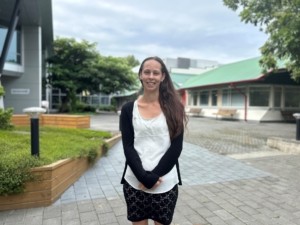
Dr Rachael Glassey is a Senior Research Fellow in the newly created Te Kura i Awarua Rangahau Māori Centre at EIT | Te Pūkenga.
Dr Rachael Glassey (Te Atihaunui-a-Papārangi) spent 10 years studying and researching in Australia, but it has been a privilege for her to return to Hawke’s Bay to work on an important study focused on children’s wellbeing.
Rachael, 33, joined EIT | Te Pūkenga last year to work on a community research project, Nourishing Hawke’s Bay: He wairua tō te kai. She has since been appointed a Senior Research Fellow in the newly created Te Kura i Awarua Rangahau Māori Centre at EIT | Te Pūkenga. She is presently working as part of a research team continuing its exploration of food security, health and wellbeing for children in Hawke’s Bay which includes a lot of work centred around the Ministry of Education’s healthy school lunch programme; Ka Ora, Ka Ako and extends further into wider food ecosystem issues.
The team is led by Principal Investigators, Professor David Tipene-Leach and Professor Boyd Swinburn. The continuation of the project is thanks to a ground-breaking two-year research grant from A Better Start E Tipu e Rea National Science Challenge, which falls under the Ministry of Business, Innovation and Employment (MBIE)
Rachael says she is glad to be back home. Since moving back here, Rachael has also been caught up in the devastation of Cyclone Gabrielle.
“It has been a tough time for our community, but I’m glad we can be here to help and support those worse off than us.”
“When I came back my new colleagues told me that Hawke’s Bay is referred to as the fruit bowl of the nation, yet we’ve got so many kids who are hungry.”
“It’s really important to have a grant like this to do some research and hopefully find ways we can improve life for our kids in Hawke’s Bay.”
Rachael says there are a number of layers to the project, starting with schools and principals who were part of the original Nourishing Hawke’s Bay project.
“This was done in conjunction with the community as a way to try to make some immediate difference for children. An important part of this research is the incorporation of mātauranga Māori. One of our goals is to create a regional food roadmap which will be a collaboration with everyone in Hawke’s Bay who is involved in the food system, including schools, whānau, growers and food rescues.”
“The overarching idea behind that is how we go further than schools and how we make a difference in the community and in people’s families or even wider than that.”
It has been a tough but worthwhile academic journey for Rachael since she was a teenage mother at Karamu High School in Hastings.
“I was 15 when I got pregnant with Summer and had her in Year 12. I went back to school and finished year 13. It was a defining moment in my life, and I went straight into tertiary education. I actually started at EIT; I think having Summer was part of my drive behind wanting to do something with my life.”
After moving to Australia, Rachael’s academic career took off, with her eventually being awarded a PhD from the University of Western Australia.
“I spent 10 years in Australia and did my PhD there. I originally studied psychology and then moved into oncology.”
“My thesis looked at the experiences of young women who have a strong family history of breast cancer and who chose to have a preventative mastectomy as a precaution. I looked at the psychological wellbeing of these women because they sat outside the box, they were young and having to make decisions about undergoing major surgery with many implications.”
Coming home to Hawke’s Bay to do meaningful research, especially since it was a new avenue, has been a remarkable experience for Rachael and she says, “coming home to New Zealand gives me further opportunity to explore my Whanganui roots”.
She and her family, which includes her husband Steven, Summer, and a toddler named Rylan, live outside Hastings.
Professor Tipene-Leach says “Te Kura i Awarua is a Māori Research Centre. Rachael has impeccable research credentials, is a natural fit here and has slotted very comfortably into this leadership role.”
EIT | Te Pūkenga Executive Dean Professor Nat Waran says: “We are very pleased to have attracted a researcher with Rachael’s experience to join the team to help develop the community centred research within Te Kura i Awarua.”

